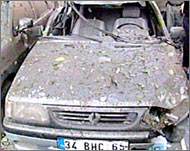PKK blamed for Istanbul attacks
Turkey has pinned the blame for the deadly Istanbul bomb attacks squarely on Kurdish separatists, dismissing a rival claim of responsibility by a group aligning itself with al-Qaida.

Turkish officials said the Kurdistan Workers Party (PKK), which recently called off a unilateral ceasefire, was behind the bombs at two small hotels and a gas depot in Turkey’s economic capital on Tuesday.
A Turk and an Iranian were killed and several foreign tourists were among the wounded.
“Without question this was done by the PKK, not al-Qaida,” a senior police official in Ankara said.
“We are 100% sure.”
The official denied reports that arrests had been made in connection with the attacks, for which both an al-Qaida-linked group and a previously unknown Kurdish group have claimed responsibility.
“Nobody has been detained,” he said.
Another police official in Istanbul said investigators specialising in al-Qaida were still on the case as well as PKK experts. Diplomats said they were keeping an open mind.
“(The Turks) seem pretty convinced – we’ll see what evidence they come out with,” one Western diplomat said.
Counterpart claims
The Abu Hafs al-Masri Brigades, which purportedly links itself to al-Qaida and has repeatedly claimed responsibility for attacks including the Madrid train bombings in March, said on an website it was behind the bombs and warned of more to come.
 |
|
Hundreds were killed in attacks |
A group calling itself the Kurdistan Liberation Hawks (TAK) also claimed responsibility through a small local news agency that often carries PKK statements. It said it was retaliating for Turkish operations against Kurdish fighters.
In a fresh statement carried by the agency on Wednesday, TAK said it had carried out a car bomb attack on the governor of the eastern Van province in July in which three people were killed.
The group also claimed responsibility for a series of what it said were other recent attacks on industrial locations and hotels in southern Turkey.
The claims could not be verified.
“We will continue our acts and struggle in all areas of Turkey,” the agency reported the group as saying. It said it would focus on tourist and economic targets and called on tourists to leave the country.
Verification
Anti-government attacks have recently flared again in the southeast after a lull of several years following the jailing of PKK leader Abdullah Ocalan in 1999. The conflict has killed more than 30,000 people, mostly Kurds.
Those arguing the PKK’s guilt point to telephone tip-offs to the gas depot and at least one of the hotels before the blasts – not a typical al-Qaida tactic.
Doubters say the PKK has traditionally operated in the rural southeast rather than the cities, although it has struck in the past in tourist resorts.
But the Ankara police official said the Istanbul attacks appeared to be linked to the recent bombings in the eastern cities of Van and Diyarbakir that killed at least four people.
He said a split and power struggle at the heart of the PKK had led one faction to start planning urban attacks.
Newspapers said detonators in Tuesday’s bombs were the same as others captured from the PKK, and the Ankara official said the type of explosive used – C4 military plastic explosive like that recently seized in swoops on suspected PKK members – also pointed to the group.
Recalling attacks
The claims evoked memories of four massive suicide bomb attacks that killed more than 60 people in Istanbul in November, allegedly carried out by a Turkish group linked to al-Qaida.
But the Abu Hafs group has not been officially linked to any of the attacks it has claimed, and officials said the bombings bore the hallmark of the PKK.